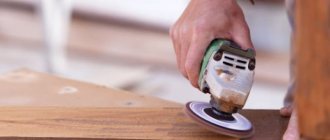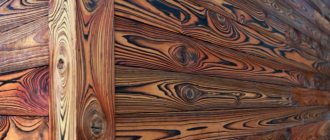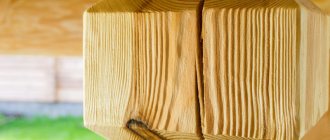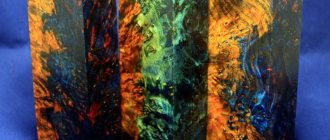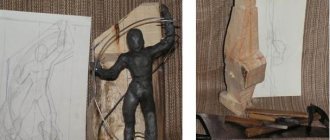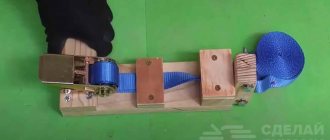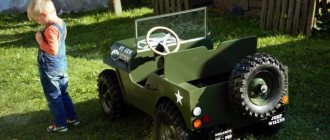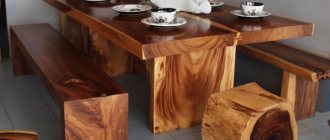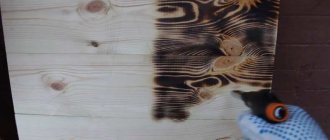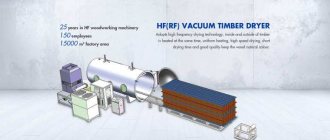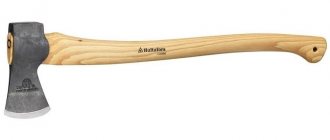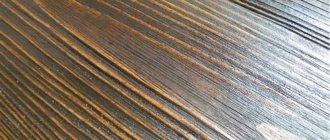The essence of brushing
Tree trunks have a multilayer structure, which, when cut, forms a peculiar pattern of fibers of different thicknesses and directions. Brushing, which is sometimes called stitching due to a lack of understanding of the essence of the issue, is sanding a wood surface with brushes using special devices or equipment. The term comes from the word brush in English. The process has nothing to do with brochures, which should be taken into account in colloquial speech.
Thanks to the brushing tool, fiber is selectively, more or less, removed from the surface of the lumber, creating a patterned relief. You can enhance the aging effect by tinting or staining wood cuts. Decorative treatment with brushes attached, for example, to a grinder, is used when finishing the following wooden structures:
- flights of stairs;
- floor coverings;
- external parts of furniture;
- elements of the interior design of premises.
The best effect is achieved when brushing larches, various types of spruce, and oak. Wood with small fibers, such as cherry, birch, maple, oak, does not form a beautiful pattern when sanded with metal and nylon brushes, used as an attachment for an angle grinder or other tool. Even pre-firing or chemical treatment of such materials does not provide the effect of a layered texture.
Preparing for work
Different types of wood can be aged using different methods. A number of methods are not suitable for working with certain varieties.
Table 1. Aging methods and types of rocks that can be subjected to the techniques.
| Technology | What breeds are recommended to use? |
| Aging by chemical action | Oak, willow, walnut, maple, beech, mahogany, linden, aspen. |
| Techniques related to mechanical surface treatment | Everything except teak, maple, cherry, beech and pear. Particularly suitable: pine, larch, oak and ash. |
The result of aging a pine board using brushing and a solution of vinegar and steel wool
Effects on the surface using special compounds can be divided into techniques:
- using a dry brush;
- patination;
- glaze;
- spray;
- crackle;
- technique for creating scuff marks (Shabby Chic);
- etching (use of compositions such as stains).
Bark beetle - a technique for applying a pattern that imitates the movement of a bark beetle larva along a tree (you can use a denture drill with a large attachment)
Processing with physical impact on wooden planes is also possible:
- brushing – a technique using brushes with metal bristles (cord brushes);
- roasting – the use of fire or metal heated to a high temperature;
- in hot sand.
Other methods are also possible - for example, imitation of natural damage, which is achieved using an awl, sandpaper and other tools.
Master Class. How to age wood?
Surface painting
Depending on the customer's wishes, paint or varnish is applied to the wood. Many people prefer coatings with silver or golden pigments, counting on the strong fixation of shiny particles deep in the wood texture. If the paint is applied correctly, reflections will appear on the wooden product in sunlight.
Some consumers like surfaces with dark, deep cracks, which are obtained by patination using special dyes. Lightened ridges of fibrous reliefs look especially impressive against a darkened background. Painting is usually carried out with brushes or a sponge, carefully observing the condition of the surface. If, when applying paint and varnish products, the fibers rise, it means that the polishing process was carried out poorly and must be repeated again.
If you carefully carry out brushing, you can obtain beautiful wood products through simple procedures using an angle grinder or other tools with brushes.
How to age wood? Preparing the material
First, before aging the wood, it must first be prepared. First of all, for brushing, it is better to choose soft wood or medium-hard wood, which has a pronounced woody texture. This could be, for example, spruce or pine. These species are distinguished by the fact that their soft fibers are often formed in spring and summer, and during this period the tree’s growth rings grow fastest, so the fibers are more “loose.” Wood with a uniform and almost unexpressed texture, such as beech and maple, is not suitable for aging.
Before starting work, the surface of the wood must be carefully prepared. All dirt and possible defects are removed, these could be traces of grease, sweat, or other stains - the fact is that they can appear when applying the tinting solution. Any wooden products must be processed in disassembled form, regardless of their size - this way you will reduce time costs and reach with a brush in all places, thereby ensuring a uniform aging effect.
Rough processing
During rough processing, work is carried out with two main attachments - a roughing attachment and a disk plane. Grinder work with this type of disc is carried out with a protective casing, because pieces of wood may fly in different directions. The plane disk is used in cases where roughing is required, preparing fence supports, constructing a log house, etc.
Requires protection from flying wood chips, glasses, thick clothing, and tough gloves. The use of a protective casing is not necessary, because The disk is all-metal, its destruction is almost impossible. When sanding wood, a grinder is used only with a second handle; work must be done with both hands.
The process of trimming a workpiece, removing the hard top layer of wood, is carried out with a peeling disk. A qualified specialist is able to perform wood sampling using this type of attachment for an angle grinder. An angle grinder can replace a carpenter's ax if a log house is being built.
Is an angle grinder suitable for working with wood?
The only operations with wood that can be performed with an angle grinder (angle grinder) without danger are grinding and roughing, and then using special attachments. Of course, you can cut wood, but it is strictly prohibited! The Internet is full of shocking photos showing what can happen when using an angle grinder as a cutting tool for wood.
The main arguments that can be made against using an angle grinder for sawing are as follows.
- This machine is not designed for sawing wood.
- Since wood has a viscous and soft structure, the saw blade can jam in it. As a result, the grinder is often torn out of the hands, and it flies in an unpredictable direction (in the leg, along the arms, in the stomach, etc.), causing deep wounds or amputation of fingers. Even fatal cases have been reported.
- When cutting wood, the saw blade heats up very quickly, causing it to begin to lose strength. The slightest misalignment or excessive pressure may cause it to fly apart. Since the spindle speed of an angle grinder is high, tool fragments fly away at the speed of shrapnel and penetrate deeply under a person’s skin. The user will be lucky if the fragments do not fly into the head or eyes.
- Despite the dangers of using saw blades with teeth, some angle grinder users ignore this fact and continue to install compass disks with large teeth or improved with carbide tips. If, when cutting wood, a hard knot or nail residue gets caught in it, the tooth or solder breaks off, gets caught by the next saw tooth and is thrown out at the speed of a bullet. One can only guess about the consequences.
- Ignoring all the warnings, users of grinders install a circular saw on the machine with a larger diameter than the protective casing. This is the most dangerous option for using an angle grinder.
If you have to cut wood constantly, it is better to purchase a special machine for this purpose, or use a jigsaw. In extreme cases, the grinder can be used as a drive and made into a circular saw, securing the device rigidly to the frame.
Design and principle of operation
In terms of ergonomics, grinders are very convenient because they allow you to perform operations for a long time without tiring the operator. For each type of work, be it preliminary cleaning, grinding or polishing with a brush grinder, the design provides the ability to change attachments. All tools of this type are electric, powered by mains or batteries.
A standard brush grinder has the following basic structural elements:
- The case is usually plastic, on which handles are installed on top: one is the front guiding handle, the second is the pushing handle, where there is a button to turn on the device.
- A brush-type electric motor is installed inside the grinder body, from which torque is supplied to the transverse shaft through the gearbox.
- The front cross shaft also serves as a holder for the grinding cylinder; the shaft is supported by bearings.
- On the bottom of the grinder body there is a wide support roller on one side of the grinding cylinder, at the rear; on the other side of the cylinder, in front, there is a second adjustable support roller. Rollers allow you to smoothly move the tool along the plane in different directions and adjust the force of pressing the tool to the surface.
- The grinding cylinder is mounted on the cross shaft of the brush grinder using a special mechanism. The cylinder itself is made like a brush, the “pile” of which can be made of different materials, such as metal wire, nylon thread and others.
The operating principle of a brush grinder is very simple: when the engine is turned on, the grinding cylinder begins to rotate quickly; the tool is applied, supported by rollers, to a pre-fixed flat surface that needs to be ground, and with methodical movements the brush grinder is moved back and forth across the entire plane, visually assessing the quality of the treatment.
Compare prices (3)
How to buy or where we are +
"SkidkaGUID" is a price comparison service in stores, a cashback service and assistance in choosing products through a selection of video reviews, testimonials and product comparisons. Most of the stores presented on the website deliver throughout Russia, so it is beneficial to use online ordering on the website of this store (you can find out whether orders are delivered to your region on the website of the selected store). To buy the selected product, you need to click the “ buy ” button next to the selected store and continue purchasing on the website of this store. To get cashback, follow the same steps by registering first.
Staining or tinting brushed wood
Coating the surface of brushed wood with paint or a tinting composition gives it a special decorative effect. Painting is carried out with a brush or sponge. During the process, carefully monitor whether the fibers rise. If fibers are noticed on the surface, it is additionally sanded with fine-grained sandpaper.
The simplest painting option is stain treatment. It quickly penetrates into the soft layers of wood remaining on the surface without affecting the hard fibers. The result is a relief structure that is particularly decorative.
Wood coated with a golden or silver coloring substance has an original appearance. Pigment particles get clogged into depressions and microcracks, which subsequently glare in the sun.
An interesting coloring technique is the arrangement of tones, repeating the play of light and shadow on the relief. The recesses are painted in a dark tone, the ridges in a light tone. Painting is carried out as follows:
- A richly dark varnish or paint is applied to the entire surface.
- The coated surface is wiped with a sponge or rag, removing paint from hard fibers where it has not yet been absorbed.
- If large areas are being painted, wait until the applied layer of varnish has dried, and then treat the surface with a petal disk with a grain size of 400 to 800. The bulges after this treatment are highlighted, then they are coated with colorless or light varnish.
Another coloring option is to cover the top tier with dark varnish and the depressions with light varnish. In this case, apply dark varnish to the surface and dry it well. Then apply the light composition and remove its excess with a rubber spatula. As a result, a dark substrate appears on the ridges.
With certain woodworking skills and using the right tools, you can do your own brushing and get excellent results. Products made from structured wood are highly decorative and give the interior an exclusive, expensive look.
How to age wood
Things from the distant past are quite popular these days. This did not bypass the design sphere either. The design of the house, which contains notes from the past in the form of old wooden furniture, floor beams, and various antique wooden decorative elements, gives it a chic and expensive look. You might even think that the owners inherited from their great-grandfathers a luxurious house that was centuries old.
In fact, everything is much simpler. The fact is that with the fashion for everything old came the concept of imitation of the old. The same thing happened with wood, because in any construction or furniture store you can find decorative elements made to match the old style. Of course, the prices for such items are quite high, so rarely anyone can afford them.
Antique wood processing is done using 3 common methods, namely:
- brushing;
- burning;
- alkali.
At home, great preference is given to option 1.
The first step is to select the wood that we will process. If you want to artificially age boards or timber to further create various objects and furniture from them, then you can choose materials with various defects (chips, small cracks, potholes, knots). After proper processing, such defects will only improve the result. If you choose ready-made furniture for aging, then you need to use pieces that look like they were made by hand in past centuries. Before processing, the furniture must be completely disassembled so that it is possible to reach hard-to-reach places.
You also need to prepare the necessary materials, such as:
- hard metal brush;
- softer wire brush;
- paint brushes;
- acrylic paint, varnish, wax or stain;
- sandpaper.
It doesn’t hurt to practice a little on unnecessary, small pieces of wood before working with the prepared material.
Some operations can be harmful to health (when fired or using chemicals), so it is better to carry them out in the fresh air and in compliance with safety rules.
Machine Applications
All three stages of finishing can be performed on special grinding machines or using other electrical equipment: grinders for smooth or angular surfaces. There are homemade brushing machines. It is difficult and expensive to make a full-fledged machine with your own hands, working like a thickness planer, so they use the same grinder with several metal and nylon attachments.
Full mechanization of work makes sense for large volumes of wood that require brushing. In such a situation, investments in the acquisition and operation of units will be justified. Common types of home repair and construction work can be quite successfully done with an angle grinder, which every craftsman has.
The secret to the popularity of brushing
The name of the technology is of English origin and means “brushing”. Brushing wood with your own hands is something that not only experienced craftsmen can do: with the right approach, anyone can master the craft of brushing.
Aged wood has not gone out of fashion for many years. Thanks to artificial aging, you can change the appearance and color of a particular type of wood, bringing a new personality to the room. Using brushing, they create a rustic, classic, vintage interior.
Artificially aged wood looks noble, a house with “antique” window frames and doors and patinated wall panels seems to have its own history. Today, aged wood is widely used not only in country houses, but also in city apartments.
Operating rules
The quality and speed of work depends on the correct choice of the required device. The following parameters influence the choice of the desired device:
- purpose and scope of use;
- frequency of use and volumes of planned work;
- type of food;
- price range;
- availability of quality certificates;
- country of manufacture;
- ease of use and ergonomics.
When working with a grinding machine, professional craftsmen recommend following the following sequence:
- connection to an electrical power source;
- holding the tool securely;
- turning on the device;
- warming up and gaining speed;
- surface treatment.
After finishing work, be sure to clean the device and lubricate all working parts. For complete dust collection, it is necessary to regularly inspect the dust collector.
To replace parts, you must choose products from the same manufacturer.
For long-term storage of the device, use only warm rooms with good ventilation.
When working with an electrical device, it is imperative to use personal protective equipment and follow safety rules that will help avoid injuries and damage to the tool.
It would not be superfluous to list the most common types of breakdowns of brushed grinding electric tools and how to eliminate them:
- oxidation of copper plates in carbon brushes - surface treatment with a rubber eraser;
- violation of the integrity of the winding - removal of the deformed part and installation of a new one;
- failure of the device control buttons - installation of new structural elements;
- deformation of rotor bearings and bevel gears - installation of new parts.
The time range for free elimination of defects is set independently by the manufacturer or seller. This service will not be provided if defects were caused by improper use, transportation or storage. When contacting the seller to solve a problem with a tool, you must provide him with all the documents, checks and receipts that confirm the purchase of the goods from him. The name of the service organization is indicated in the device passport.
To perform high-quality polishing, cleaning and grinding of various surfaces, modern manufacturers produce a huge range of grinding tools, which are widely used not only by professional builders, but also by home craftsmen. These devices significantly reduce the period of work completion and improve its quality.
Before you go shopping, you need to study all the features of this device and be sure to consult with professional builders.
Beginners should understand that a high-quality electrical device cannot have a low price.
See below for a detailed video review of the brush grinder.
Structure protection
The class of the surface after brushing can be significantly increased by coating it with a special substance. The brushing method allows you to achieve a beautiful effect, but at the same time the protection of the structure is significantly reduced. That is why you can improve the class of a product for the home by applying oil or wax using standard technology.
Oil or varnish makes it possible to make the structure protected from environmental influences. Firing makes it possible to give the floor an unusual look.
Advantages and disadvantages
Among the main advantages of this device, experts note the following:
- versatility;
- ease of use;
- high speed of work;
- expenditure of a minimum amount of physical effort;
- high quality of work;
- automatic removal of dust and other types of dirt;
- large range of models;
- wide scope of application.
Like any other device, a brush grinder has a number of disadvantages:
- the need to replace the brush depending on the type of work and the surface being treated;
- inability to process hard-to-reach areas;
- high price range;
- high number of fakes.
Services for residents of Moscow
| Player | |
| 123.ru | |
| M.Video 5% discount for online payment | |
| AliExpress | Search on Ali |
| I take it Free delivery from RUB 2,499 | Search on OBI |
| eBay | Search on eBay |
order food
| Company | Offer |
| Platypus |
Utkonos is a leader in online trading of food and related products.
order food
General Food is a foodtech company engaged in the production and delivery of healthy meals for the whole day (or a diet for 6 days) in Moscow.
order food
We prepare and deliver to your home a daily diet of healthy nutrition, packaged in boxes, at an affordable price.
What it is?
A grinder or angle grinder is a tool often used in construction and during repair work. If your house needs minor repairs, there is no point in buying powerful and expensive construction equipment. But purchasing such a car would be useful and relatively inexpensive. The versatility of a modern tool is its main advantage: angle grinders are used to saw and cut, grind and level surfaces. The principle of operation of the grinder is simple: operations are performed by rotating attachments.
Discs are divided into three types - sharpening, cutting or grinding (grinding). The operations vary in purpose and complexity; sometimes one machine has to process materials of different hardness, as a rule, stone and steel compounds, as well as wood. Renewed and processed wooden parts, windows, floors and furniture are subjected to grinding.
The attachment on the grinder for sanding wood is a replaceable circle, similar to that for a circular saw. The roughing cutter for primary grinding is made of durable metal, has teeth and is selected according to the diameter for each angle grinder. The size of the teeth is determined by the thickness of the wood layer. The shape of the tooth also matters. Variables are suitable for all types of wood, and trapezoidal ones are used only for soft varieties. The material can also be roughly processed using discs with straight teeth.
Before processing, you need to saw the wood with other sawing cutters. They are monolithic, made of high-strength sheet steel. Some varieties are made with coating on the teeth.
What kind of circles are there for cutting wood?
Processing wood with a grinder is a safe process, unlike cutting. The process is very dangerous, the tool is not intended for cutting wood
Soft woods are processed with an angle grinder attachment with extreme caution, because the tool may jam and be torn out of your hands
The cutting process at high speeds implies a high temperature effect on the disc material, as a result of which it can simply shatter into small pieces.
Despite the fact that the grinder is not suitable for cutting wood products, manufacturers offer various cutting discs for use. It is recommended to use the grinder as a stationary station when sawing wood.
Circular saws
Circular saw attachments are dangerous when using an angle grinder. The diameter of the circle must be selected based on the parameters and dimensions of the tool in order to be able to use a protective casing.
There are more expensive modifications of circular nozzles; they have anti-jamming protection. The design has teeth set in different directions, smaller in size, the price of such a device is different, but you should not save on your health.
Chainsaws
The chain type of nozzles has a safer design. The sawing disc, which uses a chain from a chainsaw, eliminates jamming of the tool and reduces the risk of injury during work. The design has a system that allows the main element, which is attached to the angle grinder, to continue rotating, and the chain can remain stationary.
Chain disks come in many different modifications, with the help of which it is possible to carry out gardening work or use it for collecting small firewood. A disk of a chain design can be used instead of a peeling disk for cutting out cups in a log or removing a layer of bark.
Saws with few teeth
Increased safety when working with wood is achieved by using discs with a small number of teeth. Small discs usually have 3 teeth, those with a diameter of more than 180 mm - 4 teeth. This type of cutting disc is used for cutting both along and across the grain of wood. The saw wheel makes it possible to cut grooves and make tenons of various shapes.
It should be understood that when working with an angle grinder, you must adhere to technical regulations. There is no need to install larger diameter discs bypassing the protective casing; smaller discs can be used without loss of cutting properties.
Tungsten carbide discs
Tungsten carbide cutting discs have been produced relatively recently and are popular when working with an angle grinder. The universal tool is not equipped with teeth; instead of cutting elements, there are cutouts in the disk. The operation of the tool is most safe when cutting wood; it eliminates jamming when nails or thick rods of wood hit. The appearance is similar to a diamond blade for cutting concrete, the purpose is indicated on the packaging or instructions.
The price of such a disk is high, but it is justified. It is worth overpaying for a modified tool rather than going broke on the sad consequences of using a regular saw blade.
Stages of work and tools used
To give a relief structure to a wood surface, you need a special set of brushes with bristles of varying density and hardness.
First stage of processing
At the first stage, a brush with hard bristles made of steel alloys or brass is used. The thickness of the fibers varies significantly among different products. You need to choose a brush in which the diameter of each metal hair will be approximately 10 times thinner than the diameter of the soft fiber of the wood being processed. Straight bristles of a brush are good at removing loose components from wood, which are cut with metal scissors before attaching them to the grinder adapter to increase the efficiency of brushing.
If necessary, double brush products can be used, providing much greater speed and efficiency. If the bristles intended to remove soft wood fibers are rounded, the process will be worse.
Working with a nylon brush
At the end of the first stage of processing, the wood surface has a rough, rough appearance. To give a decorative effect and level out all excess relief, nylon brushes for brushing wood are used, mounted on an angle grinder. They are available for sale in a wide range.
Nylon fibers differ in length, density, number or absence of abrasive particles pressed into the polymer
If abrasive grains are attached to a nylon base, you must pay attention to their grain size, hardness and compare the characteristics of the brushing brush with the density and structure of the wood
Most commonly commercially available nylon products have hardness numbers ranging from 120 to 600. Values of 120, 180 and 240 are ideal for hardwood; Products with numbers 400 and 600 in the marking should be purchased for brushing soft wood lumber.
Craftsmen who have extensive experience working with grinders will improve surface treatment technology and use not one, but several nylon brushes. Sometimes, to save money, they buy previously used polymer brushes for brushing and attach them simultaneously to the adapter of the grinder. A similar technique can also be used when using new products, although it will cost much more.
Thanks to the expanded area of the fibers of several brushes mounted on the rotating shaft of the angle grinder, it is possible to thoroughly perform a large amount of work in a short time.
Nylon hairline can be fixed to a metal or polymer base. Experience shows that the plastic disc at the base of the brush creates fewer preconditions for hair breakage and ensures their flexibility, so these products last longer.
Finishing sanding
After two stages of processing, the wood needs to be slightly dried, and then the formation of the decorative surface is completed with brushes with wool or sisal hairs. If the master prefers manual work at the final stage without using a grinder, it can be done using sandpaper flaps with small abrasive grains. Upon completion of proper brushing, the surface will acquire a perfectly smooth, beautiful appearance.
Buy in credit
| General Food |
| Growfood |
application for a card
| Company | Offer |
| Installment card "Conscience" |
Interest-free installments up to RUB 300,000 for up to 12 months for any product. QIWI Bank (JSC), Bank of Russia license No. 2241.
application for a card
Interest-free period - up to 100 days. Issuing a credit card is free
application for a card
Loan amount - up to 300,000 rubles. Interest-free period - up to 55 days!
application for a card
Up to 12 months - installment period for purchases from partners; 0% — interest on purchases in installments; Free – card registration and maintenance; 40,000 partner stores.
application for a card
Up to 10% on account balance; Free cash withdrawal from any ATM in the world; Cashback up to 30% for purchases on special offers; For citizens of any country.
application for a card
Cash loan to Sovcombank: Loan amount - from 5,000 to 100,000 rubles; Loan term - 12 months; Interest rate - from 12% per annum; Age - from 35 to 85 years.
application for a card
Debit cards: Profitable cashback up to 3.9% on all purchases; Up to 5.5% on account balance; Free delivery of the card by courier.
Vibration grinder
Vibration grinder
Sanding pad
Another name is surface grinding
car. The working unit of this tool is a rectangular base on which a sheet of sandpaper is attached. Grinding and polishing is carried out by fast back-and-forth movements of the sole (about 20,000 vibrations per minute (333.3 Hz) with an amplitude of about 2 mm). The most common two methods of attaching sandpaper are:
- Using a pressing mechanism on both sides of the sole.
- Using Velcro - the paper is simply applied with its base to the sole, which has this feature.
The sanding sheet and pad have several holes to drain dust from the work area into a dust container or vacuum cleaner. The main purpose is grinding and polishing.
Delta grinder
It is a type of vibration grinding machine. The delta sander is distinguished by a delta-shaped (triangular, like an iron) sole shape, which allows you to work in hard-to-reach places - in corners, among protrusions and other similar places. The universal cutter can perform the functions of a delta sander when installing the appropriate equipment (a triangular sole with a sticky base) and a sanding sheet).
Types of brushing
There are two ways to process a tree to reveal its structure:
- Mechanical. The wood is treated with a special tool that removes soft fibers and devices for polishing the surface.
- Chemical. It involves treating wood with special compounds (alkalies, acids, etc.) that corrode soft fibers.
The use of these types of brushing allows you to achieve different results. The mechanical method produces a textured surface, while the chemical method produces a smoother surface.
One of the techniques used by craftsmen is a combination of chemical and mechanical processing. The wood is rough processed using a chemical method, removing soft fibers. Further finishing and polishing is done mechanically.
Burning
One type of brushing is burning wood to remove soft tissue. The wood is burned with a blowtorch or gas torch, then washed and coated with oil polishing compounds.
With this brushing option, there is no need for subsequent tinting of the product, since the wood acquires a dark shade. If desired, burnt wood can be coated with colored stain.
Wood that has gone through fire and water becomes not only beautiful, but also more durable. It is practically not subject to rotting or damage by insects, so it is often used for finishing facades and building fences. There is no need to paint such a fence, since the burnt boards do not change their quality for decades.
Modern designers use fire-treated wood for interior decoration and furniture making. Not everyone likes things that look like they were left after a fire, but they look stylish and very unusual.
Types of brushes for brushing
In the brushing process, there are three stages of work - primary (roughing) processing, intermediate processing and polishing (grinding) of wood. To perform correctly, brushes of varying degrees of hardness are required, and this statement is true for both manual and electric tools. Also, aging devices vary in size, which determines their cost. Some of them are suitable not only for special brushing machines, but also for grinders due to the presence of an adapter sleeve.
Metal
Designed for rough (initial) processing of wood. The best brushes have bristles made of brass-plated steel wire. A cheaper option is all-steel brushes without brass coating. For hard rocks, you can use any product; for soft ones, you should choose brass brushes. Also among the metal tools you can see copper ones, but they are not suitable for the first stage of brushing and are intended for polishing and finishing lumber.
Brass wire brush heads
Synthetic
At the intermediate stage of brushing, nylon brushes are used. The surface after roughing remains rough and rough, and nylon fibers allow you to even out the relief. Products of various shapes and sizes are on sale, some of them are suitable for mounting on a regular angle grinder.
Nylon tools differ in the following bristles parameters:
- length;
- density;
- quantity.
Nylon bits for wood processing
Some models have special bristles, into the material of which abrasive particles are pressed. The grain size of the latter also varies: the more thorough the processing must be, the larger the size of abrasive grains should be selected. The hardness of nylon brushes is displayed in numbers from 120 to 600. Products with numbers 120-240 are suitable for hard breeds, and 400-600 for soft breeds.
Nylon fibers are fixed to a plastic or metal base. Despite the high strength of metal, it is plastic products that last longer. The hairs on them practically do not break, remain flexible, and therefore retain good performance characteristics for a long time.
Sisal
Such instruments are made from thin sisal fibers or from sisal fabric and cords. Externally, they can look like rings, circles, wheels for electrical appliances, or resemble ordinary paint brushes. Most products are impregnated to increase wear resistance and efficiency of use: impregnated fibers do not break at high rotation speeds. Sisal brushes are used at the final stage of brushing wood - during polishing.
Sisal brush for an angle grinder
Buying a good brush for artificially aging wood will provide a significant percentage of success and will seriously increase the chance of obtaining a high-quality product. There is no need to save money: it is better to choose a tool that will be easy to use and will last for many years!
A couple of antique wood recipes
You can find many recipes for aging wood using improvised means, but all of them are derivatives of the processing methods already described. Let's look at some of them.
Using wax
Using regular wax you can achieve a good effect; you only need 2 types of wax (colored and regular), as well as a wood sanding machine. This method is convenient because it does not require additional steps such as brushing the wood or using acid to remove soft parts of the wood.
You can buy any color of wax
The technology for doing the work will look like this:
- first the board is sanded, and the direction is strictly along the grain;
- then colored wax is applied; at the previous stage, the pores of the wood have opened, so it will penetrate well. It takes about a day for the coating to harden;
- Next, you will have to apply colorless wax on top of the colored one, and some of the colored wax will inevitably be removed.
An example of wood processing with colored wax
Bleached wood
Bleached wood will look unusual in any interior. It costs a lot, but you can achieve the same effect with your own hands when painting wood. The main task in this case is to ensure that the white color does not completely “clog” the texture of the wood; ideally, the wood should have a slightly grayish tint and the wood pattern should be visible through the layer of white paint.
Bleached wood
You can get the desired effect using brushing technology, and the key point will be how to paint an antique board so that the wood pattern remains noticeable after painting.
To do this, you can use tinted and transparent varnishes, and painting will be carried out in several stages:
- if the wood is dense and does not absorb varnish well, then you can immediately treat the prepared surface with tinted varnish in a couple of layers;
- then a clear varnish is applied over it to protect the tint.
Tinted varnish from a renowned manufacturer
The same effect can be achieved using white paint, but here you need to take into account that it is easy to paint over the wood pattern 100%. Therefore, after applying the paint, you can carefully blot it with a sponge so that the texture of the board becomes visible.
Description
A brushed hand sander is a universal tool that makes it possible to remove old paint, varnish and traces of corrosion from various types of wood and metal surfaces, as well as to refine a wooden structure. This device has a high level of performance and is used in conjunction with other grinders. The weight of one device does not exceed 5 kg, the number of rotations can reach up to 3000 revolutions, and the roller diameter is 120 mm.
To perform this task, manufacturers suggest using a nylon cylindrical brush. The brushing attachment makes it possible to artificially age the wooden material and remove all loose layers. After treatment, the work surface not only changes its structure, but also its color.
On the shelves of specialized departments of construction stores you can see two types of grinders.
- A tool with a wide body, behind which a shaft with attachments is hidden. The main feature is the presence of two handles and a start button.
- An instrument that has common features with a grinder. Distinctive features are the presence of a cylindrical brush and a handle, which is located parallel to the working shaft. The disadvantage is the lack of ability to adjust the processing depth.
This device consists of the following parts:
- engine;
- charger or wire to the electrical network;
- platform;
- pen;
- regulation and control system;
- working disk.
Two types of brushes are used for surface treatment:
- nylon;
- metal.
The brush has the shape of a cylinder that makes circular movements at high speed. To perform non-standard types of work, experts recommend replacing brushes and special rings.
To perform brushing, cup nylon brushes with abrasive grain on polymer threads are used, which can be attached not only to grinding machines, but also to a conventional drill.
To make work easier, the designers have provided two handles, and special pipes are installed to connect the device to the vacuum cleaner.
The number of revolutions depends on the diameter of the brush surface.
The adjustment system allows you to process products at a high level and at the same time adjust the cleaning depth.
Nozzles can be changed using a hex wrench.
Most grinding machines have auxiliary parameters:
- adjustment of the number of revolutions;
- automatic speed control;
- grinding depth adjustment;
- protection against unauthorized start;
- presence of a dust collector;
- possibility of quick replacement of deformed parts;
- additional protection of the engine from contamination.
The device may include an organizer, a set of metal, abrasive, polymer and nylon brushes, as well as a charger.
Reviews (8)
Dormidonov Oscar
What are the disadvantages? When I had to peel off 10 doors and 15 window frames from many years of paint layers, I decided that I would either turn gray, or I would have to use a hair dryer until I was blue in the face with strange things.
Advantages:
Smooth start, speed support, speed adjustment, easy brush change, powerful, inexpensive
Flaws:
Period of use:
slaev lesha
The task was to remove rust from 4 gate leaves of 3*2 meters. I went to the store to buy a grinder, since mine had just died. As a result, I bought this miracle. The gate was received in just 3 days. Then I used it to remove paint from old wood.
